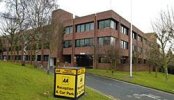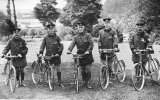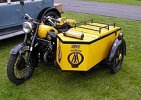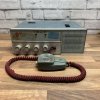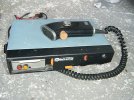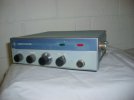-
Welcome to this forum . We are a worldwide group with a common interest in Birmingham and its history. While here, please follow a few simple rules. We ask that you respect other members, thank those who have helped you and please keep your contributions on-topic with the thread.
We do hope you enjoy your visit. BHF Admin Team
You are using an out of date browser. It may not display this or other websites correctly.
You should upgrade or use an alternative browser.
You should upgrade or use an alternative browser.
Birmingham Automobile Association
- Thread starter mw0njm.
- Start date
mw0njm.
A Brummie Dude
I went there fo traing

 www.macearchive.org
www.macearchive.org
Midland Montage: 07.08.1958: AA Training School
The Automobile Association (AA) training school at Widmerpool in Nottinghamshire.
mw0njm.
A Brummie Dude

The AA - Wikipedia
Last edited:
Radiorails
master brummie
Those were the days when you got a salute from the AA or RAC man, usually on his motor bike.
mw0njm.
A Brummie Dude
i was a very nice man a very nice man

sure did we had to smile salute and serve. and ask are you a member?Those were the days when you got a salute from the AA or RAC man, usually on his motor bike.
A Sparks
master brummie
I have an amusing story about the AA from years ago.
As a family we were on the way to my Nan's in South Worcestershire via a stretch of the motorway. There was something sounding funny with the motor of Dad's Mini so he pulled off at one of the junctions to have a look inside the bonnet, just after an AA man pulled up to see if he could help - hoping I guess to enrol a new member.
However, Dad was a member of the RAC and he suddenly noticed the badge on the front of the car so, without saying anything at all, he just walked away!
We all had a good laugh about that and Dad sorted the motor out himself.
As a family we were on the way to my Nan's in South Worcestershire via a stretch of the motorway. There was something sounding funny with the motor of Dad's Mini so he pulled off at one of the junctions to have a look inside the bonnet, just after an AA man pulled up to see if he could help - hoping I guess to enrol a new member.
However, Dad was a member of the RAC and he suddenly noticed the badge on the front of the car so, without saying anything at all, he just walked away!
We all had a good laugh about that and Dad sorted the motor out himself.
Lloyd
master brummie
I used to do my own car repairs, having mostly 'older' cars. I couldn't afford the luxury of an on the road sepair service, and was not happy to be pestered by them cajoling you to join. "I think you ought to be a member, Sir!" one of them said with a sickly smile, "as you drive an older car!" That did it for me, so I turned round, pointed to my immaculate 1950 Dsimler DB18 'Consort' and said "So if I get gearbox troubles, are you trained in the operation of the Wilson pre-select epicyclic gearbox that my car has? Could you adjust the gear brake bands if it was slipping?" Silence. "I thought not" I smirked and went for a cuppa.
Apparently, AA officers would salute any member when seen passing along the road - those displaying the badge of course. They used to have patrol boxes/huts at key junctions. Each member was issued with a key to access a phone if needing help. (Well, that's what was written in M.J.Porter's 'fictitious' book I'm reading: The Automobile Assassination - set in the 1940s). Maybe someone knows if these features of the service are true.
By the 1950s they were moving with the times.
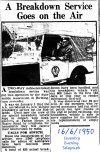
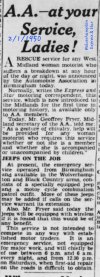
Source: British Newspaper Archive
By the 1950s they were moving with the times.


Source: British Newspaper Archive
Last edited:
mw0njm.
A Brummie Dude
19 June 1905. A small group of motoring enthusiasts band together to warn fellow drivers about speed traps.
They opt to call themselves the Motorists' Mutual Association.
In response to the zealous police enforcement of driving restrictions, the group organised teams of cyclists who, through a combination of signals and salutes, assisted drivers to stay safe on the roads and avoid punitive penalties.
A month later, as the group established an enthusiastic following among the motoring community, they settled upon a new name (and it was a real keeper). The Automobile Association.
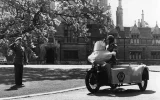
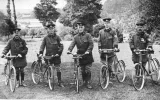
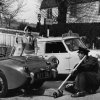
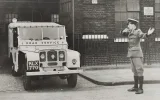
They opt to call themselves the Motorists' Mutual Association.
In response to the zealous police enforcement of driving restrictions, the group organised teams of cyclists who, through a combination of signals and salutes, assisted drivers to stay safe on the roads and avoid punitive penalties.
A month later, as the group established an enthusiastic following among the motoring community, they settled upon a new name (and it was a real keeper). The Automobile Association.




mw0njm.
A Brummie Dude
i never walked away from a brake down if i could help i did. i asked "are you a member" if yes ok if not "would you like to join?" some gave false info.other were ok.
we did have some wierd call outs like the woman with the fir coat nothing else on under it. when she called in the radio room would pass the call us and say its your turn to go out today lima? or tango? and the man who kept flashing his headlights behind me on the m6 at peak time.when i pulled on the shoulder thinking it was emergence a man got out of his triumph herald and said can i fix his radio he cant get the station he wants.. the caller who said the gear box was making a row when you drive. it turned out to be a wheel nut in the wheel trim rattling about
the poor lady who blew her engine up on the m6 i said what happened she said"i was driving along at 70 mph and saw the sign to change down to 3 then 2 then 1 and it went bang", i said they were the count down markers for the turn off not gear changes.

some one who filled the engine with water instead of the rad it siezed up after a short trip
we did have some wierd call outs like the woman with the fir coat nothing else on under it. when she called in the radio room would pass the call us and say its your turn to go out today lima? or tango? and the man who kept flashing his headlights behind me on the m6 at peak time.when i pulled on the shoulder thinking it was emergence a man got out of his triumph herald and said can i fix his radio he cant get the station he wants.. the caller who said the gear box was making a row when you drive. it turned out to be a wheel nut in the wheel trim rattling about
the poor lady who blew her engine up on the m6 i said what happened she said"i was driving along at 70 mph and saw the sign to change down to 3 then 2 then 1 and it went bang", i said they were the count down markers for the turn off not gear changes.
some one who filled the engine with water instead of the rad it siezed up after a short trip
Last edited:
mw0njm.
A Brummie Dude
no one male or female was turned away. jeeps more like a series one landyApparently, AA officers would salute any member when seen passing along the road - those displaying the badge of course. They used to have patrol boxes/huts at key junctions. Each member was issued with a key to access a phone if needing help. (Well, that's what was written in M.J.Porter's 'fictitious' book I'm reading: The Automobile Assassination - set in the 1940s). Maybe someone knows if these features of the service are true.
By the 1950s they were moving with the times.
View attachment 199466View attachment 199467
Source: British Newspaper Archive
mw0njm.
A Brummie Dude
i helped paint it a few years ago
Boduan - AA Sentry Box - 580
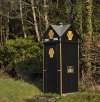
Boduan - AA Sentry Box - 580

The Telephone Box | AA Sentry Box
The 'AA' sentry box would have been a welcome sight for their patrolmen, offering shelter from bad weather while on the lookout for troubled motorists. First introduced in 1912, by the Second World War there were more than 600 boxes. But as technology developed and telephones became smaller...
www.the-telephone-box.co.uk
Brummie a long time ago
master brummie
I still have an RAC members key somewhere. I think that the AA and the RAC had the same key profile so that members could use each others boxes in an emergency. I also have a metal AA members car badge, with the members number stamped on. And an illuminated RAC car badge. Why ? No good having a memories box with nothing in it.Each member was issued with a key to access a phone if needing help
Andrew.
mw0njm.
A Brummie Dude
The number was not the membership number.)I still have an RAC members key somewhere. I think that the AA and the RAC had the same key profile so that members could use each others boxes in an emergency. I also have a metal AA members car badge, with the members number stamped on. And an illuminated RAC car badge. Why ? No good having a memories box with nothing in it.
Andrew.
Last edited:
mw0njm.
A Brummie Dude
Car badges | AA
Distinctive badges were provided to AA member drivers from 1906, for display on their vehicles. Read on for a brief history of the AA badge.
The things mentioned above are all covered in the book I mentioned earlier. So, the author did his/her research. During WW2, it's said that the boxes were painted green. Many had floral displays around the perimeter. Seems to defeat the object of camouflaging the boxes !!
By the way, Morton's book is supposed to be based around Erdington if anyone's interested - which is why I started reading it. Not enormously infomative about Erdington itself, but certainly gives a bit of an insight into how the AA etc operated.
By the way, Morton's book is supposed to be based around Erdington if anyone's interested - which is why I started reading it. Not enormously infomative about Erdington itself, but certainly gives a bit of an insight into how the AA etc operated.
Last edited:
Great photos Pete !
Radiorails
master brummie
I was a member of the RAC for some years.
The AA disgraced itself where where the RNLI was concerned by claiming to be a fourth emergency service. A feature is some West Country Carnivals was an AA vehicle on a trailer, in a broken down state, being towed by a lifeboat.
The AA disgraced itself where where the RNLI was concerned by claiming to be a fourth emergency service. A feature is some West Country Carnivals was an AA vehicle on a trailer, in a broken down state, being towed by a lifeboat.
I remember the AA patrolmen well, from the days of interminable day-long journeys on holiday, through the centre of Birmingham and the middle of every other town down the A38 towards South Devon. That was mainly from 1945 and for a year or three later. (I was too young to remember the same journey from prewar, although I did it, every year). The patrolman would flash up a smart salute as he passed us in the opposite direction on his motorbike and sidecar or was standing at the roadside. I learned why this was from my dad. "We are members of the AA and he is telling us that the road ahead is clear of problems, including speed traps. If he doesn't salute we need to watch out". I never saw one missing us or for other reasons failing to salute. It made you feel quite special! Probably some sort of crime, today, helping others to avoid a speeding ticket.
Don't recall ever seeing Pete, but I think it might have been a little before his time....... just a bit!
Chris
Don't recall ever seeing Pete, but I think it might have been a little before his time....... just a bit!
Chris

